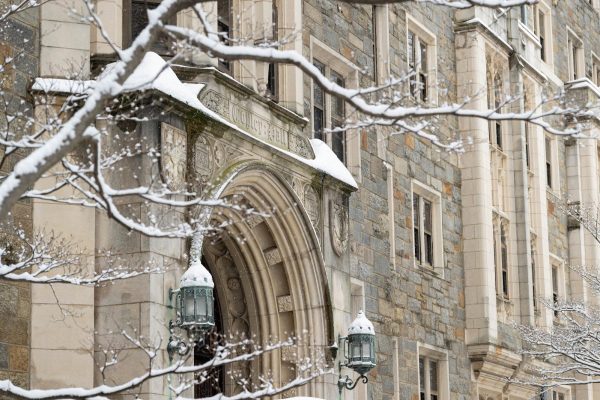Three literature experts and a Georgetown University professor argued that the unprecedented increase in book bannings and censorship in classrooms across the United States will not only silence marginalized voices but also fail to adequately address the legitimate concerns of educators Feb. 13.
Maureen Corrigan, a book critic for NPR’s Fresh Air podcast and a distinguished professor of the practice in literary criticism at Georgetown, organized the event. The event featured Ron Charles, a book critic for the Washington Post; Jessica Goudeau, a co-host of “The Beautiful and Banned,” a podcast discussing commonly targeted books in the context of today’s world; and Christine Renee Miller, an actress, professor at Wilkes University and the other co-host of the podcast.
Corrigan said the event comes at a critical time when politicians and policymakers are erasing seminal voices from curricula and libraries at alarming rates.
“The 2023-24 school year saw the highest number of books being banned from public schools and public libraries ever since Pen America, the writer’s organization, has been keeping track of book bans,” Corrigan told The Hoya. “I mean, it’s just skyrocketing, and when you look at the books that are being targeted, it’s overwhelmingly books by people of color, by LGBTQ+ authors, by women.”
Miller said spreading awareness about such bans is important, especially in the country’s current political climate.
“It’s surprising how many people are unaware that book bans are occurring across the country and how the lives of librarians and teachers have been uprooted,” Miller said during the event. “I hope students recognize that the erosion of a democracy happens slowly by a thousand cuts but staying engaged with what’s going on around us is one of the most important things we can do to combat that erosion.”

Charles said Georgetown plays a vital role in combating this increased censorship and misinformation.
“Students fortunate enough to attend institutions like Georgetown are, thankfully, insulated from the effects of the book-banning craze burning across the United States,” Charles wrote to The Hoya. “But as future civic and business leaders, they need to understand how pernicious this campaign is.”
Corrigan said it is important for faculty in higher education to model civic debates and explore controversial content rather than silencing it.
“If we can’t disagree in our classrooms or at events like tomorrow night’s event, then that makes it harder for people to actually say what they think in other spaces,” Corrigan said. “We’re supposed to be leaders of having these debates with substance, with intellectual knowledge and welcoming opposition. So if we can’t do it, it makes me despair about the future of Americans being able to have such reasonable debates.”
Goudeau said books can connect individuals with radically different experiences and perspectives.
“The right to read about people from all walks of life increases our connections with others in crucial ways,” Goudeau wrote to The Hoya. “To ban books is to take away our windows into the lives of others, and it decreases our critical thinking and our empathy — which are huge losses in today’s polarized world.”
Charles said proponents of book banning have gone too far when it comes to attacks against librarians.
“What troubles me most are the physical threats against librarians,” Charles wrote. “Of course, we can have arguments about books and whether we want our kids to read these books, but to be threatening librarians, to be calling them pedophiles, to be encouraging acts of violence, doxing them, that just cannot go on in this country and there needs to be some way to legally track those types of attacks and stop them.”
Rodrigo Borjas (CAS ’26), a student who attended the event, said he had not realized how librarians fit into the issue of banning books.
“I was not aware that librarians, especially in smaller communities and more conservative communities were receiving threats and hate for standing up for what they believe in, like certain social values and things like that,” Borjas told The Hoya. “It was eye-opening to listen and learn about the role that they play in all of this.”
Corrigan urged the audience to reflect on the power of books and the necessity of protecting students’ access to them.
“The one thing book banners and I agree on is that books are powerful. They can open up your eyes to things you’ve never thought about. It just reaffirms how powerful, but also how fragile books can be,” Corrigan said. “If we don’t show up at public library hearings, if we don’t make our voices heard — those of us who think freedom may be dangerous, but it’s better to have freedom than restriction — then books do disappear.”